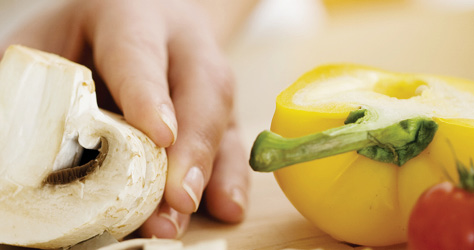Making sure you get essential vitamins
As a vegetarian or a vegan, you will know all too well the importance of keeping up your iron, vitamin B12 and protein levels – and this is even more important during pregnancy.
At a glance
- Eggs and dairy products are a great source of protein for vegetarians
- Vitamin B12 is important for your baby's growth and development
- Bread, pulses, dried fruits and dark-leafy veg are a good source of calcium for vegans

For vegetarians, eggs and dairy products such as milk, cheese and yogurts are good sources of protein, as is TVP (textured vegetable protein) such as Quorn. Vegans should look to nuts, quinoa, lentils and plant milks to keep their protein intake up. If you're vegan, you need to plan your diet carefully to ensure you get enough Vitamin B12, Vitamin B2 (Riboflavin), iron, zinc, calcium, iodine and selenium. Your midwife or doctor may recommend you see a dietician to ensure you're getting everything you and your baby needs from your diet.
Vitamin B12
A lack of Vitamin B12 could affect your baby's growth and development, so you should be looking to pack in during pregnancy. Vegetarians can get it from milk, cheese and eggs, while vegans should fill up on fortified breakfast cereals, fortified soya drinks and yeast extract products like Marmite. Speak to your midwife about B12 supplements if you are vegan, because it can sometimes be difficult to keep your intake up.
Vitamin D
Vegans can lack vitamin D during pregnancy, too, as it is found in meat, eggs and oily fish. Your body can produce its own when you are exposed to sunlight but obviously that isn't always easy in our climate! All pregnant women are now advised to take a daily vitamin D supplement (10 micrograms) throughout pregnancy, although veggies and vegans will want to check the product is not of animal origin.
Calcium
Calcium can also be an issue for vegans, as it is mainly found in dairy products – upping your intake of fortified soya, rice and oat drinks can help, as can eating sesame seeds and sesame seed products like tahini. Bread, pulses, dried fruits and dark-green leafy veg are also sources as are dried fruit and calcium set tofu.
If you are at all worried about your diet, have a chat with your doctor or midwife, or contact the Vegetarian Society who have helpful fact sheets about being animal-free in pregnancy or the Vegan Society.